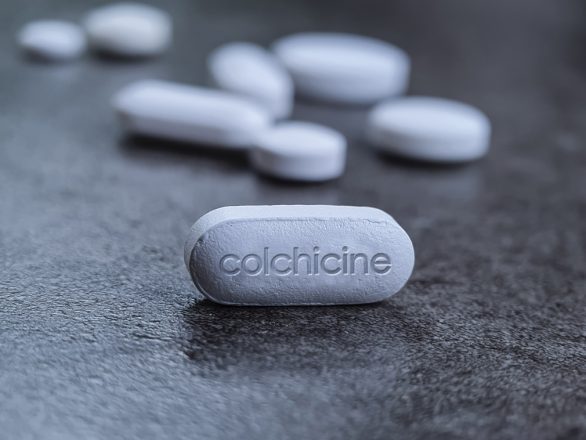Advertisment
Gout drug shows preliminary efficacy with hospitalized COVID-19 patients

Article written by Bruce Sylvester
Colchicine, a gout treatment, appears to reduce the need for oxygen therapy in COVID-19 patients, researchers reported on Feb. 4, 2021 in the online journal RMD Open, a publication of the British Medical Journal.
“Colchicine reduced the length of both, supplemental oxygen therapy and hospitalisation. The drug was safe and well tolerated,” the authors concluded.
As background, they noted that colchicine is used to treat and prevent systemic inflammatory conditions, and systemic inflammation usually appears in moderate to severe COVID-19 infection.
They defined moderate disease as fever, breathing difficulties and pneumonia. They defined severe disease as all these symptoms and a rapid breathing rate of 30 or more times a minute, plus low levels of oxygen in the body (oxygen saturation of 92% or less).
Between April and August 2020, the investigators randomized 75 subjects who had been admitted to hospital with moderate to severe COVID-19. They treated them with either standard treatment plus 0.5 mg colchicine three times a day for 5 days, followed by the same dose twice a day for 5 days, or standard treatment plus a placebo. Standard treatment at that time included doses of azithromycin, hydroxychloroquine, heparin and, as needed breathing difficulty, the steroid methylprednisolone.
Seventy-two subjects (36 placebo and 36 colchicine) completed the study.
Median time of supplemental oxygen therapy was 4 days for the colchicine group and 6.5 days for the placebo group, a significant difference (p<0.001).
Median time of hospitalsation was 7 days for the colchicine group and 9 days for the placebo group, a significant difference (p=0.003).
At day 2, 67% of the colchicine subjects versus 86% of the placebo subjects still needed supplemental oxygen. At day 7, it was 9% versus 42%, respectively, a significant difference (p=0.001).
Two patients died, both in placebo group.
The authors noted that it was a small trial, and they were not able to definitively say whether colchicine treatment will help patients avoid intensive care or lessen the risk of death.
“Whatever the mechanism of action…–colchicine seems to be beneficial for the treatment of hospitalised patients with COVID-19,” they added.





